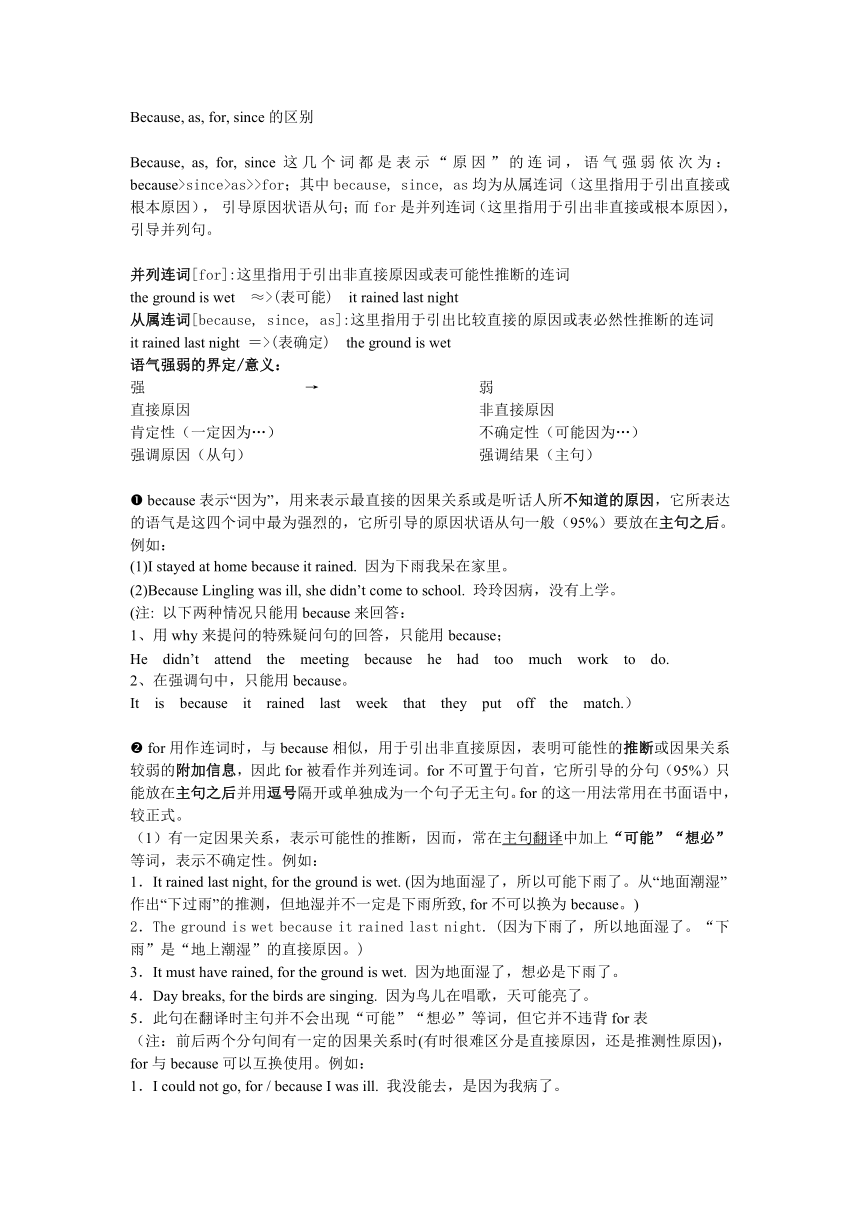because,since,as,for的区别(浓缩版)
文档属性
| 名称 | because,since,as,for的区别(浓缩版) |

|
|
| 格式 | zip | ||
| 文件大小 | 13.0KB | ||
| 资源类型 | 教案 | ||
| 版本资源 | |||
| 科目 | 英语 | ||
| 更新时间 | 2011-07-14 00:00:00 | ||
图片预览

文档简介
Because, as, for, since的区别
Because, as, for, since这几个词都是表示“原因”的连词,语气强弱依次为:because>since>as>>for;其中because, since, as均为从属连词(这里指用于引出直接或根本原因), 引导原因状语从句;而for是并列连词(这里指用于引出非直接或根本原因),引导并列句。
并列连词[for]:这里指用于引出非直接原因或表可能性推断的连词
the ground is wet ≈>(表可能) it rained last night
从属连词[because, since, as]:这里指用于引出比较直接的原因或表必然性推断的连词
it rained last night =>(表确定) the ground is wet
语气强弱的界定/意义:
强 → 弱
直接原因 非直接原因
肯定性(一定因为…) 不确定性(可能因为…)
强调原因(从句) 强调结果(主句)
because表示“因为”,用来表示最直接的因果关系或是听话人所不知道的原因,它所表达的语气是这四个词中最为强烈的,它所引导的原因状语从句一般(95%)要放在主句之后。例如:
(1)I stayed at home because it rained. 因为下雨我呆在家里。
(2)Because Lingling was ill, she didn’t come to school. 玲玲因病,没有上学。
(注: 以下两种情况只能用because来回答:
1、用why来提问的特殊疑问句的回答,只能用because;
He didn’t attend the meeting because he had too much work to do.
2、在强调句中,只能用because。
It is because it rained last week that they put off the match.)
for用作连词时,与because相似,用于引出非直接原因,表明可能性的推断或因果关系较弱的附加信息,因此for被看作并列连词。for不可置于句首,它所引导的分句(95%)只能放在主句之后并用逗号隔开或单独成为一个句子无主句。for的这一用法常用在书面语中,较正式。
(1)有一定因果关系,表示可能性的推断,因而,常在主句翻译中加上“可能”“想必”等词,表示不确定性。例如:
1.It rained last night, for the ground is wet. (因为地面湿了,所以可能下雨了。从“地面潮湿”作出“下过雨”的推测,但地湿并不一定是下雨所致, for不可以换为because。)
2.The ground is wet because it rained last night. (因为下雨了,所以地面湿了。“下雨”是“地上潮湿”的直接原因。)
3.It must have rained, for the ground is wet. 因为地面湿了,想必是下雨了。
4.Day breaks, for the birds are singing. 因为鸟儿在唱歌,天可能亮了。
5.此句在翻译时主句并不会出现“可能”“想必”等词,但它并不违背for表
(注:前后两个分句间有一定的因果关系时(有时很难区分是直接原因,还是推测性原因),for与because可以互换使用。例如:
1.I could not go, for / because I was ill. 我没能去,是因为我病了。
2.He felt no fear, for / because he was a brave boy. 他没有害怕,因为他是个勇敢的男孩。
3.You couldn't have seen him, because/for he wasn't there.你不可能见到他/想必你见不到他,因为当时他不在那里。(必然性的推断/可能性的推断)
4.The electric current must have been turned off, because/for the light went out.一定/想必是停电了,因为灯灭了。 (必然性的推断/可能性的推断)
练习:He must be ill, for he isn't here.他今天没来,看来一定是生病了。
He isn't here today because/for he is ill.因为他病了,所以他今天没有来。)
(2)因果关系较弱,表示附加信息,一般是对于主句中的事实个人看法或解释。主句翻译中有时也可加上“可能”“想必”等词,但这并不能作为判断是否用for的标志,因为它并不适用于该情况的所有句子(eg:3)。例如:
1.It will rain, for it's getting dark, 要下雨了,因为天气越来越暗了。
2.It must be snowing, for it is so bright outside.一定在下雪,外面这么亮。
3.The days are short, for it is now December. 白天短了,因为现在已是十二月份。
since侧重主句,从句表示显然的或已为人所知的理由,常译为“由于”、“既然”,语气比because稍弱,通常(95%)置于句首,表示一种含有勉强语气的原因。例如:
1.Since he asks you, you’ll tell him why. 他既然问你,那就告诉他为什么吧。(表勉强)
2.Since everyone is here, let’s start. 既然大家都到齐了,我们就出发吧!(表已为人所知)
3.Since I understood very little Japanese, I couldn’t follow the conversation. 我日语懂得不多,因而听不懂对话。(表强调主句)
(注:since也可以表示可能性推断。如: It must have rained, since the ground is wet. 想必下过雨,因为地是湿的.)
as是常用词,它表示的“原因”是双方已知的事实或显而易见的原因(since),或者理由不是很重要(for),含义与since相同,但语气更弱,没有since正式,常译为“由于,鉴于”。从句说明原因,主句说明结果,主从并重多置于句首(60%)。例如:
1. We all like her as she is kind. 我们都喜欢她,因为她善良。
2. As I had a cold, I was absent from school. 因为我感冒了,所以没去上课。
3. As Xiaowang was not ready, we went without him. 由于小王没有准备好,我们不带他去了。
Because, as, for, since这几个词都是表示“原因”的连词,语气强弱依次为:because>since>as>>for;其中because, since, as均为从属连词(这里指用于引出直接或根本原因), 引导原因状语从句;而for是并列连词(这里指用于引出非直接或根本原因),引导并列句。
并列连词[for]:这里指用于引出非直接原因或表可能性推断的连词
the ground is wet ≈>(表可能) it rained last night
从属连词[because, since, as]:这里指用于引出比较直接的原因或表必然性推断的连词
it rained last night =>(表确定) the ground is wet
语气强弱的界定/意义:
强 → 弱
直接原因 非直接原因
肯定性(一定因为…) 不确定性(可能因为…)
强调原因(从句) 强调结果(主句)
because表示“因为”,用来表示最直接的因果关系或是听话人所不知道的原因,它所表达的语气是这四个词中最为强烈的,它所引导的原因状语从句一般(95%)要放在主句之后。例如:
(1)I stayed at home because it rained. 因为下雨我呆在家里。
(2)Because Lingling was ill, she didn’t come to school. 玲玲因病,没有上学。
(注: 以下两种情况只能用because来回答:
1、用why来提问的特殊疑问句的回答,只能用because;
He didn’t attend the meeting because he had too much work to do.
2、在强调句中,只能用because。
It is because it rained last week that they put off the match.)
for用作连词时,与because相似,用于引出非直接原因,表明可能性的推断或因果关系较弱的附加信息,因此for被看作并列连词。for不可置于句首,它所引导的分句(95%)只能放在主句之后并用逗号隔开或单独成为一个句子无主句。for的这一用法常用在书面语中,较正式。
(1)有一定因果关系,表示可能性的推断,因而,常在主句翻译中加上“可能”“想必”等词,表示不确定性。例如:
1.It rained last night, for the ground is wet. (因为地面湿了,所以可能下雨了。从“地面潮湿”作出“下过雨”的推测,但地湿并不一定是下雨所致, for不可以换为because。)
2.The ground is wet because it rained last night. (因为下雨了,所以地面湿了。“下雨”是“地上潮湿”的直接原因。)
3.It must have rained, for the ground is wet. 因为地面湿了,想必是下雨了。
4.Day breaks, for the birds are singing. 因为鸟儿在唱歌,天可能亮了。
5.此句在翻译时主句并不会出现“可能”“想必”等词,但它并不违背for表
(注:前后两个分句间有一定的因果关系时(有时很难区分是直接原因,还是推测性原因),for与because可以互换使用。例如:
1.I could not go, for / because I was ill. 我没能去,是因为我病了。
2.He felt no fear, for / because he was a brave boy. 他没有害怕,因为他是个勇敢的男孩。
3.You couldn't have seen him, because/for he wasn't there.你不可能见到他/想必你见不到他,因为当时他不在那里。(必然性的推断/可能性的推断)
4.The electric current must have been turned off, because/for the light went out.一定/想必是停电了,因为灯灭了。 (必然性的推断/可能性的推断)
练习:He must be ill, for he isn't here.他今天没来,看来一定是生病了。
He isn't here today because/for he is ill.因为他病了,所以他今天没有来。)
(2)因果关系较弱,表示附加信息,一般是对于主句中的事实个人看法或解释。主句翻译中有时也可加上“可能”“想必”等词,但这并不能作为判断是否用for的标志,因为它并不适用于该情况的所有句子(eg:3)。例如:
1.It will rain, for it's getting dark, 要下雨了,因为天气越来越暗了。
2.It must be snowing, for it is so bright outside.一定在下雪,外面这么亮。
3.The days are short, for it is now December. 白天短了,因为现在已是十二月份。
since侧重主句,从句表示显然的或已为人所知的理由,常译为“由于”、“既然”,语气比because稍弱,通常(95%)置于句首,表示一种含有勉强语气的原因。例如:
1.Since he asks you, you’ll tell him why. 他既然问你,那就告诉他为什么吧。(表勉强)
2.Since everyone is here, let’s start. 既然大家都到齐了,我们就出发吧!(表已为人所知)
3.Since I understood very little Japanese, I couldn’t follow the conversation. 我日语懂得不多,因而听不懂对话。(表强调主句)
(注:since也可以表示可能性推断。如: It must have rained, since the ground is wet. 想必下过雨,因为地是湿的.)
as是常用词,它表示的“原因”是双方已知的事实或显而易见的原因(since),或者理由不是很重要(for),含义与since相同,但语气更弱,没有since正式,常译为“由于,鉴于”。从句说明原因,主句说明结果,主从并重多置于句首(60%)。例如:
1. We all like her as she is kind. 我们都喜欢她,因为她善良。
2. As I had a cold, I was absent from school. 因为我感冒了,所以没去上课。
3. As Xiaowang was not ready, we went without him. 由于小王没有准备好,我们不带他去了。
